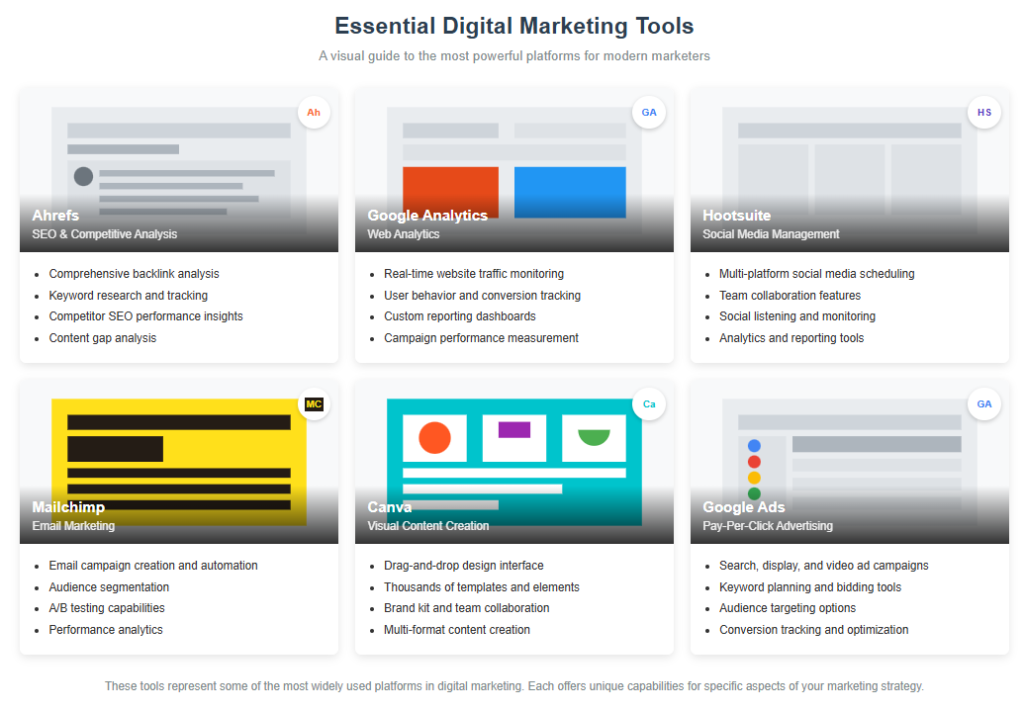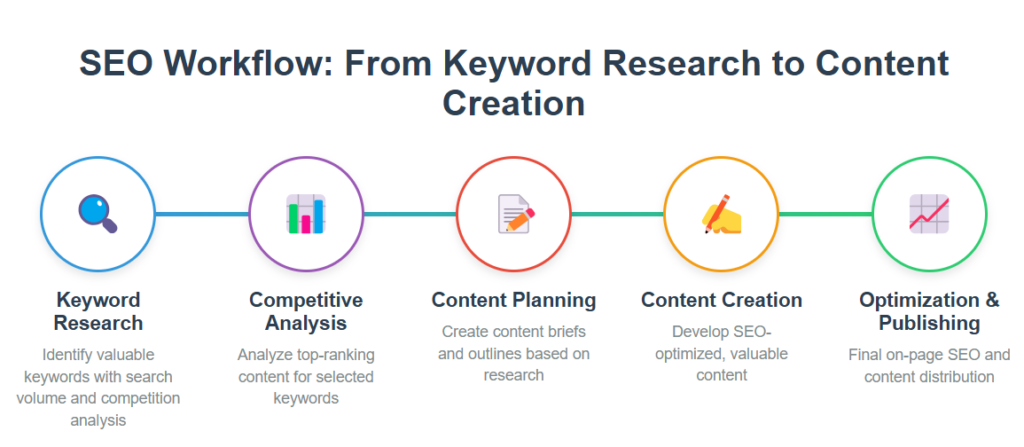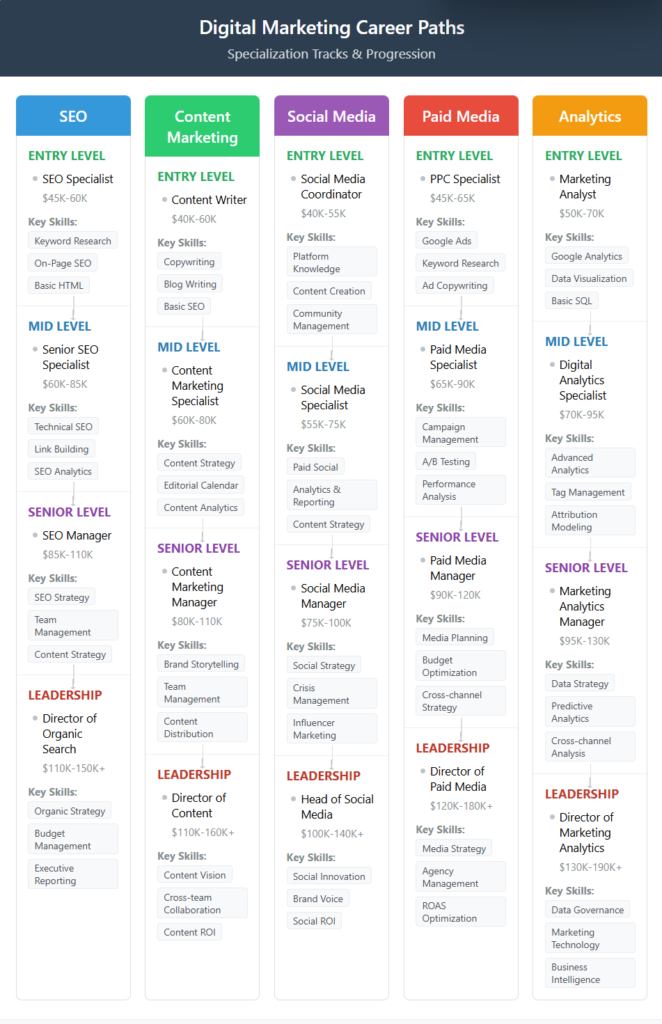Table of Contents
Introduction
In today’s digital age, digital marketing skills have become essential for professionals across almost all industries. Whether you’re looking to transition into the marketing field or hoping to increase exposure for your small business, mastering digital marketing skills can open new career and business opportunities for you.
This self-paced digital marketing course provides a structured learning path to help you progress from zero foundation to becoming a digital marketing professional. Unlike expensive bootcamps or degree programs, this free course outline gives you all the guidance you need to learn digital marketing at your own pace, with milestones and practical assignments to ensure real skill development.

Module 1: Building Digital Marketing Foundations (1-2 Months)
Difficulty Level: Beginner | Estimated Study Time: 30-40 hours
Before diving into specific areas, you need a clear understanding of the overall digital marketing framework.
1.1 Understanding Core Digital Marketing Concepts
First, you need to understand these basic concepts:
- Digital Marketing Ecosystem: Learn about various digital marketing channels and their interrelationships
- Marketing Funnel: The customer journey from awareness to conversion
- Target Audience: How to define and segment your target market
- Value Proposition: How to clearly communicate the value of your product or service
Course Materials:
1.2 Essential Marketing Tools Orientation
As a beginner in this digital marketing course, you should become familiar with these foundational tools:
- Content Creation Tools: Such as Canva (design) and ChatGPT (text creation)
- Analytics Tools: Basic Google Analytics
- Social Media Management Tools: Such as Buffer or Later
Course Assignments:
- Create a simple personal brand social media account
- Set up Google Analytics for a website (can be a personal site)
- Use Canva to create 5 different types of social media images

1.3 Developing the Digital Marketer’s Mindset
Successful digital marketing is not just about techniques and tools, but also a mindset:
- Data-Driven Decision Making: Learn to make decisions based on data rather than intuition
- Customer-Centric Thinking: Always start from the needs of your target audience
- Testing and Optimization: Cultivate the habit of continuous testing and improvement
Recommended Reading:
- “Digital Marketing” (Dave Chaffey)
- “Influence: The Psychology of Persuasion” (Robert Cialdini)
Module 1 Knowledge Check
Test your understanding of the foundations with these questions:
- Explain the concept of a marketing funnel and its stages
- What are the core channels in the digital marketing ecosystem?
- Why is data-driven decision making important in digital marketing?
Module 2: Mastering Core Marketing Channels (2-4 Months)
Difficulty Level: Beginner to Intermediate | Estimated Study Time: 60-80 hours
After building a foundation, you need to delve deeper into several core marketing channels. This module of the digital marketing course focuses on:
2.1 Content Marketing and SEO
Content marketing is the cornerstone of digital marketing, while SEO ensures your content can be found by your target audience.
Skills You’ll Learn:
- Keyword research
- Content strategy development
- Basic SEO optimization
- Content creation and editing
Course Materials:
Course Assignments:
- Conduct a complete keyword research for a topic of your choice
- Create a 3-month content calendar
- Write and optimize 3-5 blog posts

2.2 Social Media Marketing
Social media provides opportunities for direct interaction with your audience and is an important channel for building brand and community.
Skills You’ll Learn:
- Social media strategy development
- Content creation and calendar planning
- Community management and interaction
- Basic social media advertising
Course Materials:
Course Assignments:
- Develop a social media strategy for a brand (can be a personal brand)
- Create and publish content for 15 days
- Analyze which content performs best and summarize the reasons
2.3 Email Marketing
Email marketing remains one of the digital marketing channels with the highest conversion rates.
Skills You’ll Learn:
- Email list building
- Email content creation
- Automation workflow design
- A/B testing and optimization
Course Materials:
Course Assignments:
- Set up an email marketing platform
- Create a simple landing page to collect email subscriptions
- Design and send 3 different types of email campaigns

Module 2 Knowledge Check
Test your understanding of core marketing channels:
- What are the key elements of an SEO-optimized blog post?
- How do you measure the success of a social media campaign?
- What is an email marketing automation sequence and how do you set one up?
Module 3: Advancing Professional Skills (3-6 Months)
Difficulty Level: Intermediate | Estimated Study Time: 80-100 hours
After mastering core channels, this part of your digital marketing course expands to more specialized areas based on personal interests and career goals:
3.1 Paid Advertising
Paid advertising can quickly acquire traffic and potential customers, and is an important component of many marketing strategies.
Skills You’ll Learn:
- Google Ads basics
- Advanced social media advertising techniques
- Remarketing strategies
- Ad performance analysis and optimization
Course Materials:
Course Assignments:
- Create a Google Ads campaign structure (even if not actually running it)
- Design ad creatives for different platforms
- Develop a remarketing strategy for an e-commerce business
3.2 Data Analysis and Optimization
Data is at the core of digital marketing; learning to analyze and utilize data will make your marketing decisions more precise.
Skills You’ll Learn:
- Advanced Google Analytics features
- Conversion Rate Optimization (CRO)
- A/B testing methodology
- Data visualization and reporting
Course Materials:
Course Assignments:
- Set up custom reports in Google Analytics
- Design an A/B test for a landing page
- Create a comprehensive marketing dashboard

3.3 Marketing Automation
As your skills improve in this digital marketing course, you need to learn how to increase efficiency through automation.
Skills You’ll Learn:
- Marketing automation strategies
- Customer journey mapping
- Automation workflow design
- Integrating different marketing tools
Course Materials:
Course Assignments:
- Map out a complete customer journey
- Design an automation workflow for lead nurturing
- Set up at least one automated marketing process
Module 3 Knowledge Check
Test your advanced marketing skills:
- What metrics should you track to evaluate a paid advertising campaign?
- How do you set up an A/B test properly and measure statistical significance?
- Describe a basic marketing automation workflow for new leads
Module 4: Specialization and Depth (6+ Months)
Difficulty Level: Intermediate to Advanced | Estimated Study Time: 100+ hours
After completing the core modules of this digital marketing course, you can choose one or more areas for specialized development.
4.1 Choose a Specialization Direction
Based on your interests and market demand, consider these specialized directions:
- SEO Specialist: Delve into technical SEO, content SEO, and link building
- Content Strategist: Focus on content strategy, storytelling, and content marketing
- Social Media Manager: Delve into social media strategy, community building, and influencer marketing
- PPC Specialist: Focus on paid advertising strategies and optimization
- Marketing Analyst: Delve into data analysis, attribution models, and predictive analytics
- CRO Specialist: Focus on user experience and conversion rate optimization

4.2 Build a Professional Portfolio
Regardless of which specialization you choose in this digital marketing course, you need to build a professional portfolio showcasing your skills:
- Create a personal blog or website to showcase your expertise
- Participate in actual projects and document achievements
- Write case studies demonstrating your problem-solving abilities
- Share your insights on professional platforms (such as LinkedIn or Medium)
Course Assignments:
- Create a professional portfolio website
- Develop at least 3 case studies based on your practice projects
- Start sharing your knowledge through content creation
4.3 Continuous Learning and Network Building
The digital marketing field evolves rapidly; continuous learning and building a professional network are crucial:
- Attend industry conferences and seminars
- Join professional communities and forums
- Follow industry leaders and latest trends
- Consider obtaining advanced certifications or degrees
Course Assignments:
- Join at least 3 professional communities
- Connect with 20+ professionals in your chosen specialization area
- Create a continuous learning plan for the next 12 months
Module 4 Knowledge Check
Evaluate your specialization progress:
- What are the key skills and tools needed for your chosen specialization?
- How does your portfolio demonstrate these specialized skills?
- What are the current trends in your specialization area?
Course Projects
Throughout this digital marketing course, you should work on these integrated projects to build your skills and portfolio:
Beginner Project: Personal Brand Development
Create a basic digital presence for yourself including:
- Personal website with proper SEO
- Consistent social media profiles
- Content strategy for personal branding
Intermediate Project: Small Business Marketing Plan
Develop a comprehensive marketing plan for a small business (real or fictional) including:
- Market research and audience definition
- Channel strategy and content calendar
- Basic metrics and ROI calculations
Advanced Project: Full Marketing Campaign
Design and execute a complete marketing campaign including:
- Campaign strategy and goals
- Multi-channel implementation
- Results analysis and optimization recommendations
Course Resources
This self-paced digital marketing course leverages many free and affordable resources available online:
Free Digital Marketing Courses
- Google Digital Garage
- HubSpot Academy
- Facebook Blueprint
- SEMrush Academy
Recommended Books
- “Digital Marketing” by Dave Chaffey
- “Influence” by Robert Cialdini
- “Content Inc.” by Joe Pulizzi
- “Building a StoryBrand” by Donald Miller
Tools with Free Options
- Google Analytics (free)
- Canva (free tier)
- Mailchimp (free up to 2,000 contacts)
- Buffer (free tier for basic scheduling)
Student Success Stories
Many self-learners have successfully used this structured digital marketing course approach to launch their careers:
Case Study: Sarah’s Career Transition
Sarah was a teacher who transitioned to digital marketing using this learning path. Within 8 months, she had built a portfolio focusing on content marketing and SEO that helped her land a marketing coordinator role at a SaaS company.
Case Study: Michael’s Business Growth
Michael applied the principles from this course to his small landscaping business, increasing his online leads by 300% within 6 months through local SEO and targeted Facebook ads.
Frequently Asked Questions
How long does it take to complete this digital marketing course?
From zero foundation to being able to handle entry-level digital marketing positions typically requires 6-12 months of systematic learning and practice using this course structure. However, becoming an expert is an ongoing process that may take several years. The key is consistent learning and regular practice.
How does this free course compare to paid digital marketing courses?
This learning path covers the same core concepts as many paid courses and bootcamps, but requires more self-discipline. The main differences are that paid courses may offer:
- Direct instructor feedback and support
- Structured accountability systems
- Formal certification or credentials
- Job placement assistance
However, by following this course outline and actively building your portfolio, you can achieve similar skill levels without the significant financial investment.
Do I need to learn programming for this digital marketing course?
Basic knowledge of HTML and CSS is helpful for digital marketers, but not mandatory. As you progress through this course, learning some basic web skills will make you more independent in certain tasks, but most digital marketing jobs don’t require in-depth programming knowledge.
How do I build a portfolio without work experience?
- Create marketing projects for yourself or fictional brands
- Provide free marketing services to friends, family, or non-profit organizations
- Participate in marketing competitions or hackathons
- Create detailed marketing strategy case studies, even if not actually implemented
What are the most important skills taught in this digital marketing course?
Besides specific technical skills, successful digital marketers typically develop these core abilities:
- Analytical thinking and data interpretation abilities
- Creative thinking and problem-solving abilities
- Excellent written and verbal communication skills
- Ability to continuously learn and adapt to changes
- Project management and time management skills

Conclusion: Begin Your Digital Marketing Journey
This digital marketing course provides a structured path to help you develop the skills needed for success in this dynamic field. Whether you’re hoping to enhance your professional skills or increase exposure for your own projects, this self-paced learning approach can help you achieve your goals faster and more efficiently than random, unstructured learning.
Remember, the most important aspect of any course is taking action consistently. Choose an area of interest, set clear learning goals using the modules outlined here, and then invest time in learning and practicing every day. Over time, you’ll see your skills and confidence steadily improve.
Are you ready to begin your digital marketing course today? Download our free Digital Marketing Learning Path Planner to track your progress and stay motivated throughout your journey!
You might also be interested in these:
5 Best AI Content Tools for Digital Marketing Beginners in 2025: Complete Guide
From ChatGPT to Professional Marketing AI Tools: When to Upgrade Your AI Assistant
10 Essential Free Digital Marketing Courses to Learn in 2025 | Complete Guide